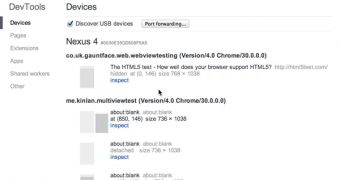Google has announced that it is ditching the old Android WebView API in favor of a new Chrome-based one. The move makes a lot of sense performance-wise; it means developers will be able to base their apps on the fast Chrome engine. And, unlike most recent similar announcements from Google, this time it's mostly good news.
The WebView API enables developers to render web content inside an app. Essentially, WebView provides a browser engine, complete with JavaScript support, for embedding in apps.
This means that web apps can easily be ported to Android, though that doesn't always have great results, or that content from the web can be rendered inside an app instead of opening it in an external browser.
As of Android 4.4 KitKat, the WebView is based on Chrome (Chromium, strictly speaking), as opposed to the old WebKit-based browser.
This means that WebView is now more compliant with web standards, since it's based on a recent stable Chromium snapshot, as well as faster, since it uses the V8 JavaScript engine and all the optimizations from the regular mobile Chrome.
Developers will be happy with the change, performance-wise. For the most part, they won't even have to make any changes to their apps, as Google designed the Chromium WebView as a drop-in replacement. There may be cases where changes are needed though, and there's a migration guide to help developers with that.
Also great news for developers is the fact that they'll be able to use the dev tools in their desktop Chrome with the WebView in their app, making it possible to debug the apps from their computers, just like they would a regular web page.
This is the part where the catch would come, normally. Recently, Google has been moving functionality away from the open source Android and into proprietary Google APIs that are only available on licensed Android devices.
But that's not the case with the new Chromium WebView. Since it's based on Chromium, Chrome's open source implementation, the source code for the WebView is part of the standard Android Open Source Project release. This means that any Android fork, officially licensed or not, will be able to make use of the new WebView.

 14 DAY TRIAL //
14 DAY TRIAL //